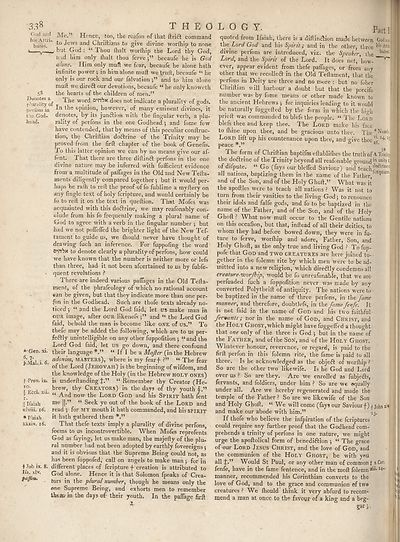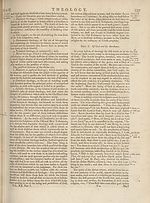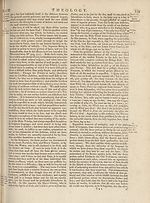Encyclopaedia Britannica, or, a Dictionary of arts, sciences, and miscellaneous literature : enlarged and improved. Illustrated with nearly six hundred engravings > Volume 20, SUI-ZYM
(380) Page 338
Download files
Complete book:
Individual page:
Thumbnail gallery: Grid view | List view

338
God ant]
It is Attri-
bates.
Me.”
THEOLOGY.
Hence, ton, the reafon of that ftri6t command
Part
to Jews and Chri'ftians to give divine woriliip to none
but God : “ Thou flialt worfhip the Lord thy God,
5,8
Denotes a
plurality of T Te*
pet inns in In the
the. God-
head.
a:,d him only llialt thou ferve •” becaufe he is God
alone. Him only muft we fear, becaufe he alone hath
infinite power; in him alone muft we truft, becaufe “ he
only is our rock and our falvation and to him alone
muft we direft f>ur devotions, becaufe “ he only knovveth
the hearts of the children of men.”
The word D'nbx does not indicate a plurality of gods,
the opinion, however, of many eminent divines, it
denotes, by its junction with the lingular verb, a plu¬
rality of perfons in the one Godhead ; and fome few
have contended, that by means of this peculiar conftruc-
tion, the Chriftian do&rine of the Trinity may be
proved from the firft chapter of the book of Genefis.
J o this latter opinion we can by no means give our af-
lent. That there are three diftinft perfons in the one
divine nature may be inferred with fufficient evidence
from a multitude of palTages in the Old and New Tefta-
ments diligently compared together; but it would per¬
haps be ralh to reft the proof of fo fublime a myftery on
any Angle text of holy feripture, and would certainly be
fo to reft it on the text in queftion. That Mofes was
acquainted with this do&rine, we may reafonably con¬
clude from his fo frequently making a plural name of
God to agree with a verb in the fingular number ; but
3iad we not poffeffed the brighter light of the New Tef-
tament to guide us, we ftiould never have thought of
drawing fueh an inference. For fuppofing the word
D'rtbx to denote clearly a plurality'of perfons, how could
we have known that the number is neither more or lefs
than three, had it not been afeertained to us by fubfe-
quent revelations *
There are indeed various pafiages in the Old Telia-
ment, of the phrafeology of which no rational account
can be given, but that they indicate more than one per-
fbn in the Godhead. Such are thofe texts already no¬
ticed ; “ and the Lord God faid, let us make man in
our image, after OUR likenefs and “ the Lord God
faid, behold the man is become like one of us.” To
thefe may be added the following, which are to us per-
feftly unintelligible on any other fuppofition ; “and the
Lord God faid, let us go down, and there confound
* Gen. xi. their language “ If I be a Majler (in the Hebrew
i 6 adonim, masters), where is my fearf ?” “ The fear
of the Lord (Jehovah) is the beginning of wifdom, and
the knowledge of the Holy (in the Hebrew holy ones)
j'Prev. ix* is underftanding L” “Remember thy Creator (He¬
brew, thy Creators) in the days of thy youth §.”
“ And now the Lord God and his Spirit hath fent
me ||.” “ Seek ye out of the book of the Lord and
read ; for MY mouth it hath commanded, and his SPIRIT
io
§ Eccl. xii.
jj I fa i ah
sdviii. 16.
* Tfaiah
xxxiv. 16.
it hath gathered them
That thefe texts imply a plurality of divine perfons,
feems to us incontrovertible. When Mofes reprefents
God as faying, let us make man, the majefty of the plu¬
ral number had not been adopted by earthly fovereigns ;
and it is obvious that the Supreme Being could not, as
has been fuppofed, call on angels to make man ; for in
flobix. 8. different places of feripture f creation is attributed to
Ifa. xlv. gocj a]one> Hence it is that Solomon fpeaks of Crea¬
tors in the plural number, though he means only the
one Supreme Being, and exhorts men to remember
theBi' in the days of their youth. In the paffage firft
1
pa (Jim.
quoted from Ifaiah, there is a diftin&ion made between GwlacJ
the Lori/ God and his Spirit; and in the other, three
divine perfons are introduced, viz. the Speaker, the butl;s'
Lord, and the Spirit of the Lord. It does not, how- ~~ir'
ever, appear evident from thefe paffages, or from any
other that we recolleff in the Old Teftament, that the
perfons in Deity are three and no more : but no fober
Chriftian will harbour a doubt but that the precife
number was by fome means or other made known to
the ancient Hebrews ; for inquiries leading to it would
be naturally fuggefted by the form in which the high
prieft was commanded to blefs the people. “ The Lord
blefs thee and keep thee. The Lord make his face
to ftiine upon thee, and be gracious unto thee. The *^Tmn,)'f|
Lord lift up his countenance upon thee, and give thee ^ 24,
peace
I he form of Chriftian baptifm eftablifhes the truth of A Trinit J
the dodlrine of the Trinity beyond all reafonable ground ’n unity1 j
of difpute. “ Go (fays our bleffed Saviour) and teach (!0<^rmec|
all nations, baptizing them in the name of the Father,tCnptUi:e‘
«md of the Son, and of tire Holy Ghoft.” What was it
the apoftles were to teach all nations ? Was it not to
turn from their vanities to the living God; to renounce
their idols and falfe gods, and fo to be baptized in the
name of the Father, and of the Son, and of the Holy
Ghoft ? What now muft occur to the Gentile nations
on this occafion, but that, inftead of all their deities, to
whom they had before bowed down, they were in fu¬
ture to ferve, worftiip and adore, Father, Son, and
Holy Ghoft, as the only true and living God ? To fup-
pofe that God and two creatures are here joined to¬
gether in the folemn rite by which men were to be ad¬
mitted into a new religion, which diredlly condemns all
creature-worjkip, would be fo unreafonable, that we are
perfuaded fueh a fuppofition never was made by any
converted Polytheift of antiquity. The nations were to
be baptized in the name of three perfons, in the fame
manner, and therefore, doubtlefs, in the fame fenfe. It
is not faid in the name of God and his two faithful
fervants; nor in the name of God, and Christ, and
the Holy Ghost, which might have fuggefted a thought
that one only of the three is God ; but in the name of
the Father, and of the Son, and of the Holy Ghost.
Whatever honour, reverence, or regard, is paid to the
firft perfon in this folemn rite, the fame is paid to all
three. Is he acknowledged as the objeft of worfhip ?
So are the other two likewife. Is he God and Lord
over us ? So are they. Are we enrolled as fubjefts,,
fervants, and foldiers, under him ? So are we equally
under all. Are we hereby regenerated and made the
temple of the Father ? So are we likewife of the Son
and Holy Ghoft. “ We will come (fays our Saviour f) j j0hn xin
and make our abode with him.” 23.
If thofe who believe the infpiration of the feriptures
could require any further proof that the Godhead com¬
prehends a trinity of perfons in one nature, we might
urge the apoftolical form of benediftion ; “ The grace
of our Lord Jesus Christ, and the love of God, and
the communion of the Holy Ghost, be with you
all J.” Would St Paul, or any other man of common! a Cor.
fenfe, have in the fame fentence, and in the moft folemn
manner, recommended his Corinthian converts to the
love of God, and to the grace and communion of twe
creatures ? We fhould think it very abfurd to reconw
mend a man at once to the favour of a king and a beg-
gar;
God ant]
It is Attri-
bates.
Me.”
THEOLOGY.
Hence, ton, the reafon of that ftri6t command
Part
to Jews and Chri'ftians to give divine woriliip to none
but God : “ Thou flialt worfhip the Lord thy God,
5,8
Denotes a
plurality of T Te*
pet inns in In the
the. God-
head.
a:,d him only llialt thou ferve •” becaufe he is God
alone. Him only muft we fear, becaufe he alone hath
infinite power; in him alone muft we truft, becaufe “ he
only is our rock and our falvation and to him alone
muft we direft f>ur devotions, becaufe “ he only knovveth
the hearts of the children of men.”
The word D'nbx does not indicate a plurality of gods,
the opinion, however, of many eminent divines, it
denotes, by its junction with the lingular verb, a plu¬
rality of perfons in the one Godhead ; and fome few
have contended, that by means of this peculiar conftruc-
tion, the Chriftian do&rine of the Trinity may be
proved from the firft chapter of the book of Genefis.
J o this latter opinion we can by no means give our af-
lent. That there are three diftinft perfons in the one
divine nature may be inferred with fufficient evidence
from a multitude of palTages in the Old and New Tefta-
ments diligently compared together; but it would per¬
haps be ralh to reft the proof of fo fublime a myftery on
any Angle text of holy feripture, and would certainly be
fo to reft it on the text in queftion. That Mofes was
acquainted with this do&rine, we may reafonably con¬
clude from his fo frequently making a plural name of
God to agree with a verb in the fingular number ; but
3iad we not poffeffed the brighter light of the New Tef-
tament to guide us, we ftiould never have thought of
drawing fueh an inference. For fuppofing the word
D'rtbx to denote clearly a plurality'of perfons, how could
we have known that the number is neither more or lefs
than three, had it not been afeertained to us by fubfe-
quent revelations *
There are indeed various pafiages in the Old Telia-
ment, of the phrafeology of which no rational account
can be given, but that they indicate more than one per-
fbn in the Godhead. Such are thofe texts already no¬
ticed ; “ and the Lord God faid, let us make man in
our image, after OUR likenefs and “ the Lord God
faid, behold the man is become like one of us.” To
thefe may be added the following, which are to us per-
feftly unintelligible on any other fuppofition ; “and the
Lord God faid, let us go down, and there confound
* Gen. xi. their language “ If I be a Majler (in the Hebrew
i 6 adonim, masters), where is my fearf ?” “ The fear
of the Lord (Jehovah) is the beginning of wifdom, and
the knowledge of the Holy (in the Hebrew holy ones)
j'Prev. ix* is underftanding L” “Remember thy Creator (He¬
brew, thy Creators) in the days of thy youth §.”
“ And now the Lord God and his Spirit hath fent
me ||.” “ Seek ye out of the book of the Lord and
read ; for MY mouth it hath commanded, and his SPIRIT
io
§ Eccl. xii.
jj I fa i ah
sdviii. 16.
* Tfaiah
xxxiv. 16.
it hath gathered them
That thefe texts imply a plurality of divine perfons,
feems to us incontrovertible. When Mofes reprefents
God as faying, let us make man, the majefty of the plu¬
ral number had not been adopted by earthly fovereigns ;
and it is obvious that the Supreme Being could not, as
has been fuppofed, call on angels to make man ; for in
flobix. 8. different places of feripture f creation is attributed to
Ifa. xlv. gocj a]one> Hence it is that Solomon fpeaks of Crea¬
tors in the plural number, though he means only the
one Supreme Being, and exhorts men to remember
theBi' in the days of their youth. In the paffage firft
1
pa (Jim.
quoted from Ifaiah, there is a diftin&ion made between GwlacJ
the Lori/ God and his Spirit; and in the other, three
divine perfons are introduced, viz. the Speaker, the butl;s'
Lord, and the Spirit of the Lord. It does not, how- ~~ir'
ever, appear evident from thefe paffages, or from any
other that we recolleff in the Old Teftament, that the
perfons in Deity are three and no more : but no fober
Chriftian will harbour a doubt but that the precife
number was by fome means or other made known to
the ancient Hebrews ; for inquiries leading to it would
be naturally fuggefted by the form in which the high
prieft was commanded to blefs the people. “ The Lord
blefs thee and keep thee. The Lord make his face
to ftiine upon thee, and be gracious unto thee. The *^Tmn,)'f|
Lord lift up his countenance upon thee, and give thee ^ 24,
peace
I he form of Chriftian baptifm eftablifhes the truth of A Trinit J
the dodlrine of the Trinity beyond all reafonable ground ’n unity1 j
of difpute. “ Go (fays our bleffed Saviour) and teach (!0<^rmec|
all nations, baptizing them in the name of the Father,tCnptUi:e‘
«md of the Son, and of tire Holy Ghoft.” What was it
the apoftles were to teach all nations ? Was it not to
turn from their vanities to the living God; to renounce
their idols and falfe gods, and fo to be baptized in the
name of the Father, and of the Son, and of the Holy
Ghoft ? What now muft occur to the Gentile nations
on this occafion, but that, inftead of all their deities, to
whom they had before bowed down, they were in fu¬
ture to ferve, worftiip and adore, Father, Son, and
Holy Ghoft, as the only true and living God ? To fup-
pofe that God and two creatures are here joined to¬
gether in the folemn rite by which men were to be ad¬
mitted into a new religion, which diredlly condemns all
creature-worjkip, would be fo unreafonable, that we are
perfuaded fueh a fuppofition never was made by any
converted Polytheift of antiquity. The nations were to
be baptized in the name of three perfons, in the fame
manner, and therefore, doubtlefs, in the fame fenfe. It
is not faid in the name of God and his two faithful
fervants; nor in the name of God, and Christ, and
the Holy Ghost, which might have fuggefted a thought
that one only of the three is God ; but in the name of
the Father, and of the Son, and of the Holy Ghost.
Whatever honour, reverence, or regard, is paid to the
firft perfon in this folemn rite, the fame is paid to all
three. Is he acknowledged as the objeft of worfhip ?
So are the other two likewife. Is he God and Lord
over us ? So are they. Are we enrolled as fubjefts,,
fervants, and foldiers, under him ? So are we equally
under all. Are we hereby regenerated and made the
temple of the Father ? So are we likewife of the Son
and Holy Ghoft. “ We will come (fays our Saviour f) j j0hn xin
and make our abode with him.” 23.
If thofe who believe the infpiration of the feriptures
could require any further proof that the Godhead com¬
prehends a trinity of perfons in one nature, we might
urge the apoftolical form of benediftion ; “ The grace
of our Lord Jesus Christ, and the love of God, and
the communion of the Holy Ghost, be with you
all J.” Would St Paul, or any other man of common! a Cor.
fenfe, have in the fame fentence, and in the moft folemn
manner, recommended his Corinthian converts to the
love of God, and to the grace and communion of twe
creatures ? We fhould think it very abfurd to reconw
mend a man at once to the favour of a king and a beg-
gar;
Set display mode to:
![]() Universal Viewer |
Universal Viewer | ![]() Mirador |
Large image | Transcription
Mirador |
Large image | Transcription
Images and transcriptions on this page, including medium image downloads, may be used under the Creative Commons Attribution 4.0 International Licence unless otherwise stated. ![]()
| Permanent URL | https://digital.nls.uk/192279487 |
|---|
| Description | Plates 516, 519 and 520 missing. |
|---|---|
| Attribution and copyright: |
|
| Description | Ten editions of 'Encyclopaedia Britannica', issued from 1768-1903, in 231 volumes. Originally issued in 100 weekly parts (3 volumes) between 1768 and 1771 by publishers: Colin Macfarquhar and Andrew Bell (Edinburgh); editor: William Smellie: engraver: Andrew Bell. Expanded editions in the 19th century featured more volumes and contributions from leading experts in their fields. Managed and published in Edinburgh up to the 9th edition (25 volumes, from 1875-1889); the 10th edition (1902-1903) re-issued the 9th edition, with 11 supplementary volumes. |
|---|---|
| Additional NLS resources: |
|

